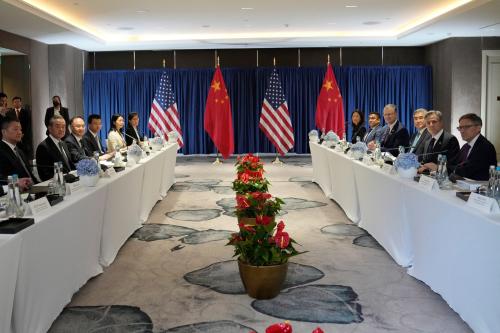There is a perception that Chinese talented youth are itching to flock to American shores, so much so that legislatures have attempted to curtail their entry. However, the reality is quite the opposite: Just this year, India has eclipsed China in sending the most international students to the United States. This is the first time China has lost that distinction since 2008.
Although Chinese students’ enrollment in the United States has rebounded this year, this growth may not reflect the choices of China’s top talent. Many may be coming to avoid China’s ultra-competitive college entrance exam. The critical question is: For those who can get into China’s top colleges, do they still prefer to study in the United States?
Brain drain? Not necessarily
Quality, not quantity, is paramount. I argue that the United States has increasingly lost the heart of China’s best and brightest, those who, given the chance, prefer to stay within China’s own top institutions. This complicates the prevailing impression that China has suffered from brain drain as its top talent cannot wait to leave China.
A recent report from Tsinghua University, China’s leading institution, reveals the trend for China’s top talent: Over the past few years, the number of Tsinghua graduates who chose to study in the United States plummeted — from 11% in 2018 to a mere 3% in 2021. Many attribute this decline to the pandemic; however, the proportion of Tsinghua graduates studying in the United Kingdom has not declined at all, and the number of those choosing to study in Singapore has even risen. In the most recent report issued in 2022 — the year when China ended the “zero-COVID” policy, only 7% of the entire graduating class, including both undergraduates and graduates, chose to study abroad. The share of those going to the United States is unreported.
My recent trip to China in summer of this year has affirmed the sentiment that today, American higher education has diminished appeal for China’s best and brightest. During my conversations with Tsinghua University faculty and students regarding whether they would consider studying in the United States, they expressed fear and anxiety about what they perceive as “a hostile America” toward China — specifically, the U.S. policies targeting Chinese talent and the broader anti-China rhetoric. Instead, they’d rather compete to get into the graduate program at Tsinghua or other top Chinese institutions.
A hostile climate for Chinese in the United States
This sentiment marks a significant change from the late 1980s and 1990s. For example, when Shi Yigong, the former vice president of Tsinghua University, graduated in 1989, more than 70% of his graduating class at Tsinghua chose to study in the United States. A similarly drastic drop in interest in studying in the United States is reported in other top universities in China such as Peking University.
The geopolitical tensions between the United States and China are chilling Chinese students’ passion for American education. Trump administration-era policies, such as Proclamation 10043 which prohibits granting visas to Chinese students from universities supporting China’s military-civil fusion strategy, have been continued by the Biden administration. While this policy is supposed to affect no more than 5,000 applicants per year, it has triggered widespread concern among Chinese students about the United States’ perceived hostility. Indeed, a Pew Research report from April of this year indicates soaring negative American sentiment toward China; 83% of U.S. adults have an unfavorable view of China, including 44% who have a very unfavorable opinion.
In other words, souring U.S.-China relations, rising anti-China sentiments, and the concurrent, dramatic increase in anti-Asian hate crimes have inadvertently helped alleviate China’s brain drain — a longstanding issue the Chinese state has sought to address through talent recruitment programs. Over 1,400 Chinese scientists have dropped their American university or corporate affiliations and returned to China in 2021, based on their publication records, and 4 in 10 scientists of Chinese descent at elite American universities are considering leaving. This seems to complicate assertions that China is suffering from brain drain, which has dominated recent media coverage.
The rise of Chinese universities
The other reason for top students staying in China is the ascendancy of Chinese universities. China has been outpacing the United States in the number of science, technology, engineering, and math (or STEM) Ph.D. graduates since the mid-2000s. This year it surpassed the United States in the number of papers published and cited in the world’s most influential journals for the first time. The return of esteemed faculty from top American universities is another appeal. For example, Yau Shing-Tung, the first Chinese winner of the Fields Medal, the highest honor in mathematics, left Harvard to join the Tsinghua faculty in 2022. If hawkish U.S. positions against China have pushed Chinese top talent away, the rise of China’s universities has effectively pulled in that talent.
This is not meant to imply that Chinese migrants are not interested in coming to the United States — they still are. This year, for example, more Chinese undocumented immigrants crossed the U.S.-Mexico border amid China’s economic downturn than in the entire previous decade. However, the reality is that while the United States is experiencing increasing rates of Chinese asylum-seekers and other economic migrants, it is simultaneously seeing decreasing rates of China’s top talent coming to its shores. The United States cannot be complacent in seeing that more Chinese immigrants want to live in the United States without realizing that China’s best and brightest are not coming but leaving.
U.S. STEM sector dependence on foreign talent
Some opinion leaders in the United States do not fully grasp how American science and technology education and innovation depend on foreign talent, of which Chinese talent is among the largest. They consider Chinese students as threats to U.S. national security, based on their incorrect assumption that most are sponsored by the Chinese government. In fact, most Chinese undergraduate students use family funds and pay full tuition to American universities, while doctoral candidates are often funded by American higher education and serve as teaching and research assistants.
The negative repercussions of declining Chinese student interest in American higher education are undermining those institutions’ instruction, research, and innovation. As a matter of fact, American higher education has depended on international students in STEM fields for decades because of domestic students’ reluctance to study STEM.
A Pew Research report shows that most Americans with college degrees believe that American youth do not study STEM because these fields are too hard. My colleagues in STEM disciplines have felt the drastic decline of the applications from top Chinese universities, hindering their research productivity. Moreover, this has also influenced undergraduate education as these students often take on teaching and research assistant roles.
Policy solutions to attract talent
Whether the United States has permanently lost its charm with regard to China’s top talent remains unknown. While concerns over intellectual theft are valid, any policy or discourse that weaponizes this concern, and targets groups based on their race, ethnicity, or national origin is fundamentally against American values and interests. Therefore, the need for U.S. politicians to tone down their anti-China rhetoric and scale back the hawkish policies that target Chinese talent has become more pressing than ever.
This is precisely what I hope will emerge from President Joe Biden’s meeting with Chinese President Xi Jinping at the Asia-Pacific Economic Cooperation summit: reducing visa hurdles, especially for STEM graduate students; creating clear pathways to permanent residency; and restoring people-to-people ties, such as the Fulbright Program and the Peace Corps. Otherwise, the United States is compromising its own national security and competitiveness, as the heart of the U.S.-China competition is about talent.







Commentary
How America lost the heart of China’s top talent
November 16, 2023